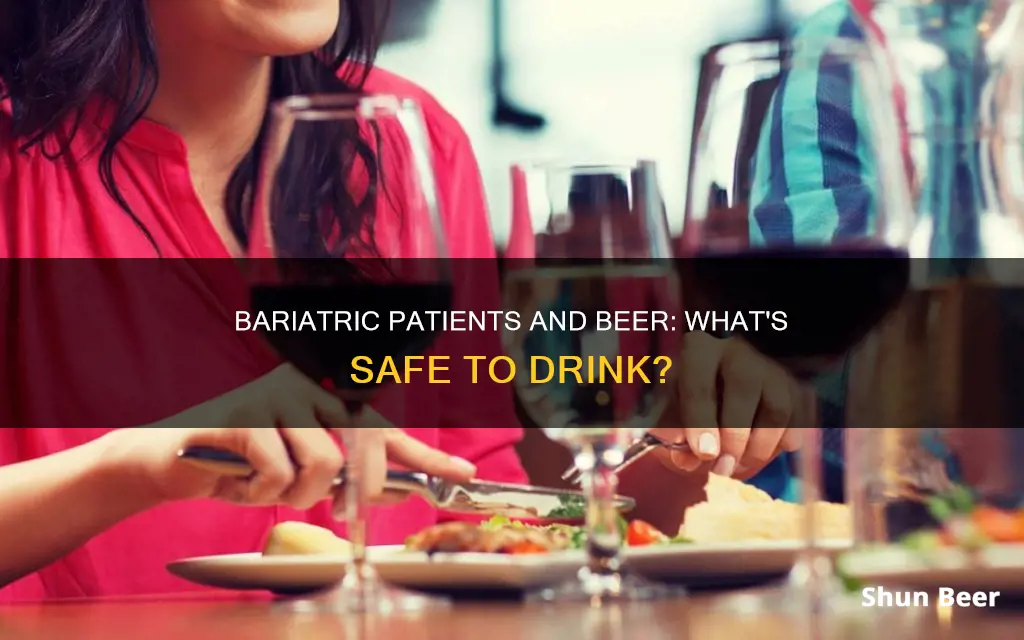
Bariatric patients should refrain from drinking beer, or any other alcoholic beverage, for at least six months after their surgery. Weight loss surgery changes the way the body metabolises alcohol, and patients may get drunk more quickly than before surgery. Alcohol is also high in calories and sugar, which can sabotage weight loss goals. However, if bariatric patients do choose to drink, they should be aware of how their body will process alcohol differently and reintroduce it slowly.
| Characteristics | Values |
|---|---|
| Drinking beer after bariatric surgery | Possible, but not recommended |
| Waiting period | Abstain from alcohol for at least 6 months to a year |
| Blood alcohol levels | Rise more quickly |
| Food portions | Smaller, expediting absorption into the bloodstream |
| Low blood sugar | Likely, due to reduced glycogen |
| Hypoglycemia symptoms | Slurred speech, confusion, loss of coordination, poor vision |
| Alcoholism | A small percentage of patients develop problems with alcohol |
| Reintroducing alcohol | Gradual reintroduction with modifications |
| DUI | Possible after 1 beer with dinner |
| Calories | Beer contains ~160 calories |
| Carbonation | Can irritate and stretch the stomach |
What You'll Learn
- Bariatric patients should wait at least six months after surgery before drinking alcohol.
- Alcohol can irritate the stomach and cause digestive issues.
- Drinking alcohol can lead to low blood sugar and hypoglycaemia
- Carbonated alcoholic drinks can irritate and stretch the stomach
- Alcohol can cause weight gain and affect weight loss goals

Bariatric patients should wait at least six months after surgery before drinking alcohol.
During the first year after bariatric surgery, the body is in a "Rapid Weight Loss" phase, and drinking alcohol can interfere with this process. Alcohol is often high in calories and sugar, which can hinder weight loss and even lead to weight gain. Additionally, the body's ability to metabolise alcohol is greatly reduced after bariatric surgery, which can cause patients to become intoxicated after consuming only a small amount of alcohol. This increased sensitivity to alcohol can lead to dangerous complications, such as low blood sugar (hypoglycaemia), which can result in brain and nerve damage, loss of consciousness, and even death if left untreated.
Furthermore, drinking alcohol too soon after bariatric surgery can irritate the stomach and cause physical discomfort. Carbonated alcoholic beverages, such as beer, can irritate and stretch the gastric pouch, leading to discomfort and potentially long-term complications. Therefore, it is recommended that bariatric patients avoid carbonated drinks and sugary mixers, opting instead for low-calorie options if they choose to drink.
Waiting at least six months before consuming alcohol allows the body to heal and adjust to its new post-surgical state. During this time, patients can learn about the effects of alcohol on their bodies and make informed decisions regarding alcohol consumption. It is important to reintroduce alcohol gradually and responsibly, paying attention to any signs of intoxication or adverse reactions.
Overall, while it is possible for bariatric patients to drink alcohol, it is crucial to prioritise health and well-being by waiting at least six months after surgery and always consuming alcohol in moderation.
Beer and Shraddha: A Spiritual Conundrum for Devotees
You may want to see also

Alcohol can irritate the stomach and cause digestive issues.
The absorption and metabolism of alcohol are also affected by bariatric surgery. The surgery removes or reduces the stomach's ability to produce certain enzymes that aid in alcohol digestion. This means that the small bowel receives unfiltered and full-strength alcohol, increasing the risk of intoxication. Additionally, alcohol passes through the stomach and into the small intestine more quickly, leading to higher blood alcohol levels and an increased risk of alcohol use disorders.
It is recommended that bariatric patients refrain from drinking alcohol for at least six months after surgery, and preferably a full year. This allows the body to heal and adjust to its new post-surgical state. After this period, patients should reintroduce alcohol gradually and responsibly, starting with small amounts and avoiding carbonated and sugary drinks. It is important for patients to be mindful of the effects of alcohol and to drink slowly to avoid accidental overconsumption.
The consumption of alcohol can also sabotage a patient's healthy eating plan. Alcohol is sugar, and mixed drinks often contain additional sugary additives. This can lead to weight stabilization or even weight gain. Therefore, bariatric patients should be cautious and practice moderation when it comes to alcohol consumption.
Drinking Beer on Shinkansen: What You Need to Know
You may want to see also

Drinking alcohol can lead to low blood sugar and hypoglycaemia
Additionally, drinking on an empty stomach or when blood sugar levels are already low can further increase the likelihood of experiencing hypoglycaemia. This is because the liver needs food in the stomach to release glucose into the bloodstream effectively. Bariatric patients are also more likely to have reduced glycogen in the body, and consuming alcohol can further deplete this, leading to low blood sugar.
Symptoms of hypoglycaemia include slurred speech, confusion, loss of coordination, and poor vision. If you notice any of these symptoms, it is important to take action to raise your blood sugar levels. This can include ingesting glucose tablets, diluted juice, or a snack with protein and complex carbohydrates.
To prevent hypoglycaemia, it is recommended to avoid drinking on an empty stomach and to monitor blood sugar levels while drinking. It is also crucial for bariatric patients to gradually and responsibly reintroduce alcohol and be mindful of the modified metabolic process and the risk of low blood sugar and intoxication.
Does Abstaining From Beer Affect Yeast Infections?
You may want to see also

Carbonated alcoholic drinks can irritate and stretch the stomach
After bariatric surgery, it is important to be aware that your body will respond differently to food and drink. Carbonated alcoholic drinks, such as beer or rum and coke, can cause irritation to your stomach and may stretch the skin of the stomach, leading to discomfort and long-term complications. This is due to the carbonation in these drinks, which can cause gas and bloating.
The stomach is particularly sensitive after bariatric surgery, and the carbonation in these drinks can irritate the lining of the stomach. This can lead to digestive issues and physical discomfort. It is important to note that the stomach has been reduced in size, and the carbonation can stretch the stomach pouch, causing discomfort. This can also lead to a reversal of the changes made during the original surgery.
Alcoholic drinks, in general, are not recommended for bariatric patients as they can irritate the newly formed stomach sleeve and go against the goal of weight loss. Alcohol is sugar, and the more you consume, the more empty calories you are taking in, which can sabotage your healthy eating plan. Additionally, mixed drinks often contain sugary additives like fruit juices, which can cause weight gain or stabilization.
It is best to refrain from alcohol for at least six months after bariatric surgery, and even after this period, it is important to reintroduce it slowly and in moderation. When drinking, it is recommended to avoid carbonated beverages and opt for low-calorie options such as spirits mixed with calorie-free mixers or dry wines. Always be mindful of how your body responds and stop drinking if you start to feel tipsy.
Drinking Beer in Dishonored: What's the Deal?
You may want to see also

Alcohol can cause weight gain and affect weight loss goals
Alcohol can indeed cause weight gain and affect weight loss goals. Here are some key ways in which alcohol consumption can impact your weight:
Impaired Fat Burning and Increased Calorie Intake:
- Alcohol inhibits your body's ability to burn fat. When you consume alcohol, your body prioritises metabolising it, leading to the storage of excess glucose and lipids as adipose tissue or body fat.
- Alcoholic drinks often contain "empty calories". These are calories that provide little to no nutritional value. A standard beer, for example, contains approximately 155 calories, which can contribute to weight gain over time.
Hormonal Impact:
- Alcohol can affect the levels of hormones in your body, such as testosterone, which plays a role in metabolic processes like muscle formation and fat burning.
- It can also influence hormones related to hunger and energy storage, such as leptin and glucagon-like peptide-1 (GLP-1). By inhibiting these hormones, alcohol may increase your appetite and food intake.
Poor Decision Making:
- Alcohol lowers inhibitions and impairs judgement, making it harder to stick to dietary restrictions or healthy eating habits.
- It can trigger hunger signals in the brain, leading to increased food intake and cravings for salty, greasy foods.
Sleep Disturbances:
Drinking alcohol before bed can disrupt your sleep quality, leading to sleep deprivation. This, in turn, can impact the hormones related to hunger, satiety, and energy storage, making it more challenging to maintain a calorie deficit.
Organ Health:
- Excessive alcohol consumption can lead to alcoholic fatty liver, which affects your liver's ability to metabolise and store carbohydrates and fats efficiently, making weight loss more difficult.
- Alcohol can also cause stress on the stomach and intestines, impairing digestive secretions and the absorption of essential nutrients.
Bariatric Surgery Considerations:
For individuals who have undergone bariatric surgery, alcohol consumption can have even more pronounced effects:
- The surgery alters how the body handles alcohol, leading to faster absorption and a lower tolerance. Even small amounts of alcohol can lead to intoxication and low blood sugar.
- It is recommended to avoid alcohol for at least six months to a year after bariatric surgery to ensure a safe and gradual reintroduction, allowing your body to adjust to its new metabolic state.
Old Beer: Is It Safe to Drink After a Year?
You may want to see also
Frequently asked questions
Yes, but it is not recommended. Beer is a carbonated alcoholic drink, and carbonation can irritate and stretch the stomach, causing discomfort and long-term complications. Alcohol is also full of empty calories and can cause weight gain. It is best to wait at least six months after surgery before drinking any alcohol, and even then, it is important to reintroduce it slowly and in moderation.
Bariatric surgery changes the way your body handles alcohol. Your body will be more sensitive to alcohol, and it will take less to become intoxicated. This is because alcohol passes through the stomach and into the small intestine more quickly, so it hits your system faster and harder. You may feel drunk after just one drink!
Drinking after bariatric surgery can cause physical discomfort, and it goes against your weight loss goals. It can also lead to low blood sugar, which can be dangerous and cause symptoms such as slurred speech, confusion, loss of coordination, and poor vision. In the long term, drinking can also cause weight stabilisation or weight gain.
If you want to drink alcohol after bariatric surgery, it is important to wait at least six months to a year, and always speak to your doctor first. Start slowly and sip drinks to see how your body reacts. Avoid carbonated beverages and sugary mixers, and try to drink with food to slow down absorption. Be mindful of the caloric content of alcoholic drinks, and never drink and drive.







